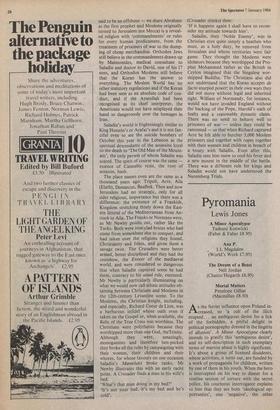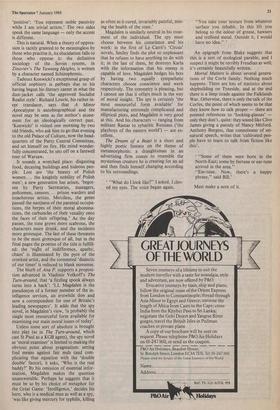Pyromania
Lewis Jones
A Minor Apocalypse Tadeusz Konwicki (Faber & Faber £8.95) Ana P.
I.I. Magdalen (World's Work £7.95) The Dream of a Beast Neil Jordan (Chatto/Hogarth £6.95)
Mortal Matters Penelope Gilliat (Macmillan £8.50) As the Soviet influence upon Poland in- creased, so 'a cult of the illicit erupted... an ambiguous desire for a lick of the forbidden, a pitiful delight in political pornography dressed in the lingerie of allusion'. A Minor Apocalypse clearly intends to gratify this 'ambiguous desire', and its self-description in such exemplary terms of marxist abuse is highly significant. It's about a group of licensed dissidents, whose activities, it turns out, are funded by a work of propaganda for children, written by one of them in his youth. When the hero is intercepted on his way to dinner for a routine session of torture with the secret police, his courteous interrogator explains to him that they are both 'ideological op- portunists', one 'negative', the other
`positive': 'You represent noble passivity while I am trivial action.' The two sides speak the same language — only the accent is different.
This is natural. When a theory of oppres- sion is tacitly granted to be meaningless by those who practise it, its elucidation falls to those who oppose it: the definitive sociology of the Soviet system, in Zinoviev's The Yawning Heights, is written by a character named Schizophrenic.
Tadeusz Konwicki's exceptional grasp of official sophistry is perhaps due to his having begun his literary career in what the dust-jacket calls 'the approved Socialist Realist style'. Richard Lourie, his rather in- ept translator, says that A Minor Apocalypse is autobiographical and the novel may be seen as the author's atone- ment for an ideologically correct past. `Konwicki' is visited one morning by two old friends, who ask him to go that evening to the old Palace of Culture, now the head- quarters of the Party Central Committee, and set himself on fire. His mind wonder- fully concentrated, he sets off on a farewell tour of Warsaw.
It sounds a wretched place: disgusting food, decaying buildings and hideous peo- ple. Lost are 'the beauty of Polish women... the knightly nobility of Polish men'; a new generation has arisen, 'begot- ten by Party Secretaries, managers, policemen, censors... prison warders and treacherous artists. Merciless, the genes passed the nastiness of the parental occupa- tions, the herpes of their moral abomina- tions, the carbuncles of their venality onto the faces of their offspring.' As the day passes, the tone grows more scabrous, the characters more drunk, and the incidents more grotesque. The last of these threatens to be the most grotesque of all, but in the final pages the promise of the title is fulfill- ed: the `niiht of indifference, apathy, chaos' is illuminated by the pyre of the crooked artist, and the tormented 'dialectic of our times' is reduced to blank nonsense.
The blurb of Ana P. supports a proposi- tion advanced in Vladimir Volkoff's The Turn-around, that 'a fizzling spook always turns into a hack': 'LI. Magdalen is the pseudonym of a former member of the in- telligence services, an erstwhile don and now a correspondent for one of Britain's leading newspapers'. It adds that the spy novel, in Magdalen's view, 'is probably the single most resourceful form available for examining our main moral issues of today'.
Unless some sort of absolute is brought into play (as in The Turn-around, which cast St Paul as a KGB agent), the spy novel as 'moral examiner' is limited to making the obvious point about pragmatism: setting foul means against fair ends (and com- plicating that equation with the 'double double' factor), it asks, 'Who is the real baddy?' By his omission of essential infor- mation, Magdalen makes the question unanswerable. Perhaps he suggests that it must be so by his choice of metaphor for the Great Game: 'Intelligence,' decides his hero, who is a medical man as well as a spy, `was like giving mercury for syphilis, killing
as often as it cured, invariably painful, min- ing the health of the state.'
Magdalen is similarly neutral in his treat- ment of the individual. The spy must choose between his conscience and his work: in the first of Le Carre's 'Circus' novels, Smiley finds the plot so unpleasant that he refuses to have anything to do with it; in the last of them, he destroys Karla with the information that his enemy is capable of love. Magdalen hedges his bets by having two equally sympathetic characters choose conscience and work respectively. The symmetry is pleasing, but I cannot see that it offers much in the way of moral insight. The spy is certainly 'the most resourceful form available' for manufacturing extremely complicated and elliptical plots, and Magdalen is very good at this. And his characters — ranging from militant Rastas to sybaritic Russians (' the playboys of the eastern world') — are ex- cellent.
The Dream of a Beast is a short and highly poetic fantasy on the theme of metamorphosis: a draughtsman in an advertising firm comes to resemble the mysterious creature he is creating for an ad and then finds himself changing according to his surroundings.
"What do I look like?" I asked. I clos- ed my eyes. The voice began again. "You take your texture from whatever surface you inhabit. In this lift you belong to the odour of grease, hawsers and trellised metal. Outside it, I would have no idea." ' An epigraph from Blake suggests that this is a sort of ecological parable, and I suspect it might be terribly Freudian as well; it's certainly beautifully written.
Mortal Matters is about several genera- tions of the Corfe family. Nothing much happens. There are lots of statistics about shipbuilding on Tyneside, and at the end there is a limp tirade against the Falklands War. Otherwise, there is only the talk of the Corfes, the point of which seems to be that they know how to talk proper — there are pointed references to looking-glasses' only they don't, quite: they sound like Clive James giving a parody of Nancy Mitford. Anthony Burgess, that connoisseur of un- natural speech, writes that 'cultivated peo- ple have to learn to talk from fiction like this'.
"Some of them were born in the North-East; some by fortune or ear-tune arrived in the area."
"Ear-tune. Now, there's a happy phrase," said Bill.'
Must make a note of it.



































 Previous page
Previous page